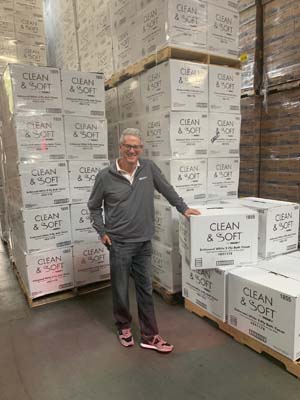
Other items in today’s column include:
*Scenes around San Diego County
*Other coronavirus news
*Letter to the editor
*Political bytes


SAN DIEGO — It’s not every day that Charles Wax, owner of Waxie Sanitary Supply, and staff members receive phone calls from mayors, county supervisors, or governors. But these are not everyday times.
As the largest privately owned janitorial and sanitary supply company in America, Waxie Sanitary Supply stocks the bathrooms and janitorial supply cabinets of many schools, hospitals, government office buildings, prisons, and other institutions throughout the nine western states. To do so, it has 200 delivery vehicles stationed at 25 regional warehouses. Headquarters for the entire operation is in the Kearny Mesa neighborhood of San Diego.
Since the coronavirus became recognized as a pandemic, leaders of local and state governments have been telephoning Waxie hoping to obtain more supplies. “I spoke to the mayor [Kevin Faulconer] the other day,” Wax told me in an interview. “They needed stuff for the parks and we took care of them.”
Just in the last few weeks, he said, “I’ve talked to mayors, board of supervisors, the district attorney,” and one Waxie staff member even spoke with Colorado Gov. Jared Polis [a former San Diegan], Wax said. While other companies have been required to close, Waxie has been declared an essential service because it supplies materials that everyone wants — toilet paper, paper towels, hand sanitizers, gloves, disinfectant sprays. To handle the increase in demand, Waxie has been hiring temporary help throughout its system. Currently it has approximately 1,000 employees.
Eric Cohen, the Waxie executive who coordinates the company’s logistics, said prior to the COVID-19 outbreak, the company handled 3,027 orders per day. This month, amid the outbreak, the number of orders per day has climbed to 5,074. Before the outbreak, the company shipped an average of 1,092,072 pounds of supplies per day. This month the daily average is up to 1,552,602 pounds, Cohen said.
“People are calling for everything that they can get,” Wax said. “In addition, we’ve had the public coming in off the street to buy toilet paper. They have to buy a case, which is normally 80 rolls, and we have to limit customers to one case. We had a car dealership–I won’t mention the name –that wanted to buy 100 cases of toilet paper for a promotion they were doing, either selling them or giving them away free. We had to pull that back, gave them only a few.”
Rick Hazard, Waxie’s senior vice president for marketing, said for the month of March, “we are triple our normal sales in paper, disinfectants are five times normal, soaps and sanitizers triple, gloves about triple.”
“Do you know those Clorox wipes that come in canisters? They are like gold right now,” Hazard said.
How about masks? I asked.
“We sold them out in the first week,” Wax responded.
While the company still has good supplies of toilet paper in stock, its supplies of hand sanitizer have been bought up. Getting more is “months out,” said Wax.”You need an act of Congress practically to get some.” Purell, for whom Waxie is a big customer, has had to limit supplies to its vendors. “What they’re trying to do is limit everyone to what they previously bought and maybe increase it 10 percent. They can’t get it out fast enough.”
Wax speculated that the coronavirus pandemic may leave changed lifestyles in its wake.
“Will this change people’s habits, what they do, and the emphasis they are putting on cleaning?” Wax asked. “So many of our cleaning contractors say that [the owners of] their buildings want them to go down and wipe things clean. They are doing things they never would do before. All of a sudden this has gotten such high visibility, it has become a number one priority for so many businesses. Will people be washing their hands more frequently? Will people be using Purell and disinfecting more often? Will these habits last?
“I think it will make people appreciate cleanliness and keeping the place disinfected and cleaner,” Wax said. “I think people will be much more concerned. Think about the school building where your kids are, that kind of thing. I hope people will take it more seriously.”
*
Scenes around San Diego County

Numerous synagogues are taking to the Internet to create online worship opportunities for their congregants. Prior to Shabbat, Orthodox Rabbi Avram Bogopulsky went to the empty sanctuary of Beth Jacob Congregation to record a sermon on the weekly Torah portion.
Conservative Rabbi Joshua Dorsch invited his Tifereth Israel Synagogue congregation to join him, his wife Stephanie, and children Nadav and Ziva via the Internet in the traditional Friday night blessings over candles, wine or grape juice, and bread. That was followed by an interactive Friday night service in which he was assisted by guitarist/ vocalist Ted Stern.
And a bit later Friday evening, Reform Cantor Cheri Weiss of the San Diego Outreach Synagogue led from her home an Internet service in which she was assisted on guitar by her husband Dan Weiss.



*
Other coronavirus news
*City Councilwoman Barbara Bry, whose office has been collating coronavirus news from the various levels of government, reports that a county news conference on Friday revealed that as of 4 p.m. that day, 1,049 tests for coronavirus had been administered in the county; and that the total number of known cases were 105. By age, these included: 10-19 years: 1 case ; 20-29 years: 20 cases; 30-39 years: 24 cases; 40-49 years: 22 cases ; 50-59 years: 13 cases; 60-69 years: 4 cases ; 70-79 years: 15 cases; 80+ years: 6 cases . Hospitalized Cases: 13
*State Sen. Brian Jones, R-Santee, has announced that the American Red Cross Bloodmobile will be positioned from 10 a.m., Wednesday, March 25, at the CVS parking lot at 572 Fletcher Parkway in El Cajon, to replenish blood supplies. “Blood donations are running very low due to concerns over the coronavirus,” he said. “Donating blood is considered ‘essential’ and is an exemption to the Governor’s ‘Stay at Home’ executive order. All safe medical practices and social distancing will be in effect at the Bloodmobile site.” Appointments may be made via this link.
*Temple Emanu-El has been the subject of a ‘phishing’ attack by an Internet scammer pretending to be Rabbi Devorah Marcus, the Reform synagogue has warned its congregants. A letter from the temple’s executive administrative assistant Donna Lander said: “It has come to our attention that again, several of our congregants have received illegitimate emails purporting to be from Rabbi Devorah. They ask congregants to contact the Rabbi and then to purchase eBay gift cards in support of a sick congregant. However, if you look closely you will see that the email address they are coming from is rabdevorah.teesd@gmail.com which is not our Temple email account. These are “phishing” attempts and you should delete these emails. This is a good time to remind ourselves that cyberattacks like these, via email, are the most common method that criminals use to obtain information from you which can be used for their purposes. Whenever you receive an email that looks suspicious there are a few things you can check: (1) If the email content seems off or if you have any doubt, do not click any links or open any attachments. If the email is purportedly from someone you know either call them or send them an email to an email address you have on file to confirm the email is legitimate. (2) Check the sending person’s email address as email addresses can be spoofed, i.e., faked. Often times these will have a slight misspelling or in this case, come from an email account, i.e. gmail.com that is not the company email account. Any communication from our Temple should come from teesd.org, not gmail.com. (3) Misspellings or bad grammar. Often times the criminals are from outside the US and misspellings and grammar can be a telltale sign of a phishing attempt. (4) Be aware that these attacks can be very personal and sophisticated and have logos and other graphics that would lead you to believe they are from a legitimate institution such as a bank. They may also have links that also look legitimate and go to sites that also look legitimate, but are not. It is safest to go to the bank or other company website and log in directly, not via the link in the email. (5) When in doubt, delete the email. It’s unfortunate that this is the world we live in, but we hope by providing you this information you can be better informed and keep your own information safe.”
*Rocketing around the Internet is Kitty O’Meara’s meditation on the pandemic, which can be found in a YouTube video above. The words of the meditation were sent to me by Arlene LaGary, president of Temple Beth Shalom, who said she received them from congregant Dr. Louis Lurie, who explained that they came to him from Cantor Chayim Frenkel of Kehillat Israel in Pacific Palisades, California. Cantor Frenkel said his wife found it on the Internet, and suggested that I take the first few words of the meditation –“And the people stayed home. And read books ” — and Google it, and sure enough! The YouTube video came up. So one mystery is solved. But there is another one. Who is Kitty O’Meara? When you Google that name, you find obituaries of people who died years before the pandemic!
*
Letter to the Editor: Administration calling it ‘Chinese virus’ is a racist slur
President Trump and members of his administration have defended calling the novel coronavirus the “Chinese virus” and some have referred to it as the “Kung Flu,” as if it were appropriate to mix an ethnic slur with a pun in such a tragic and serious situation. Saying “we have no racist intentions”, and “it originated in China, so it’s a Chinese virus” doesn’t diminish the damage to our multi-ethnic society.
Perhaps the administration, and its apologists, would benefit from thinking from a different perspective. If the first cases of COVID-19 had appeared in Israel instead of China, would the president have been free to refer to it as “the Jewish virus” or the “Jew Flu”? As an American Jew, I’d be horrified and afraid. Asian-Americans, and all Americans, should be horrified by the president’s words. — Richard W. Merel, M.D., Hermosa Beach, California
Political bytes
*With 16,000 votes throughout the county still to be counted, the Registrar of Voters’ tally on Saturday showed Barbara Bry lengthening her lead to 656 votes over third place finisher Scott Sherman, a fellow member of the San Diego City Council, in the race to become mayor of San Diego. It seems more and more certain that Bry will be in the Nov. 3 runoff against Todd Gloria, who placed well ahead of his competitors. The results at the end of counting Saturday were: Gloria 145,102; Bry 79,747; and Sherman 79,091. The next update from the Registrar of Voters is expected at 5 p.m., Monday, March 23.
*
Donald H. Harrison is editor of San Diego Jewish World. He may be contacted via donald.harrison@sdjewishworld.com